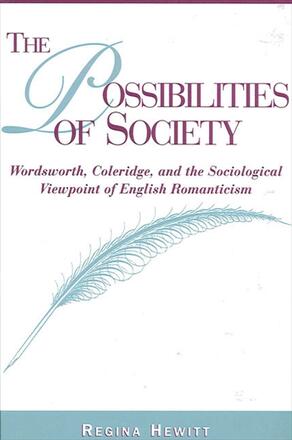
The Possibilities of Society
Wordsworth, Coleridge, and the Sociological Viewpoint of English Romanticism
Alternative formats available from:
Approaches English Romanticism through sociological theory, arguing that Wordsworth and Coleridge tested hypotheses about social organization and action in their poetry. Offers a timely reevaluation of the Romantic poets as socially engaged thinkers.
Description
This innovative book revises many standard assumptions in both literary and sociological fields. Approaching English Romanticism through sociological theory, Hewitt argues that Wordsworth and Coleridge tested hypotheses about social organization and (inter)action in their poetry. She analyzes their achievements in representative works and looks at ways in which Byron, Shelley, and Keats modified the older poets' endeavor. She also describes the context for "poetic" sociology within the intellectual systems of the poets' day, comparing it to the context in which "scientific" sociology was later institutionalized.
Hewitt's work offers a timely reevaluation of the Romantic poets as socially engaged thinkers. Moreover, her reconstruction of a "poetic" sociology identifies an alternative field of knowledge that contemporary scholars might still explore.
Regina Hewitt is Associate Professor of English at the University of South Florida. She is the author of Wordsworth and the Empirical Dilemma.
Reviews
"This is a remarkable piece of work, authentically original scholarly criticism, written with extreme clarity and consistent cogency. It makes me realize how biased are the usual ways of reading Romantic poetry, both the traditional 'aesthetic' way and the contemporary 'political' way." — Karl Kroeber, Mellon Professor in the Humanities, Department of English, Columbia University
"This is a bold and brave undertaking, for it runs counter to a mode of criticism that is particularly well established in Romantic studies. Fully aware of the implications of her revisionist reading of the major Romantic poets, the author has been meticulous in setting forth her argument." — Frederick Burwick, Department of English, University of California, Los Angeles
"The argument is so completely original, so unexpected in its vision of Romantic poetry, that one is continually forced to rethink previous understanding. Most new academic studies are exercises in fine-tuning; this book is breathtaking in its complete originality of approach. So effectively is the argument developed that what at first seems an outlandish thesis comes to seem perfectly obvious and self-evident by the end of the book." — Robert M. Ryan, English Department, Rutgers University